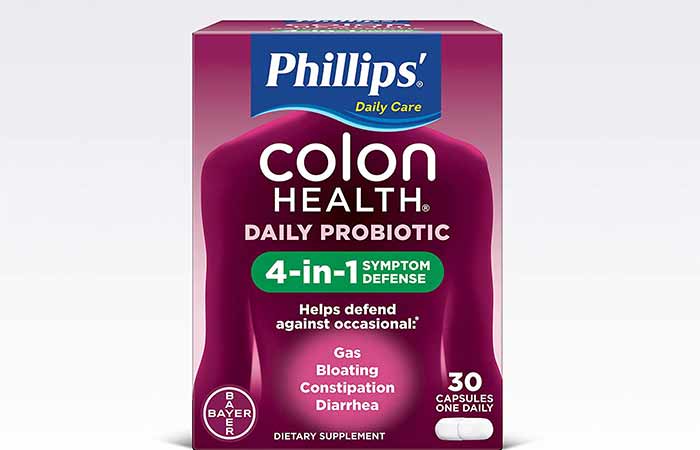Phillips Colon Health Side Effects & Benefits
The Phillips Colon Health is yet another great probiotic supplement that’s not only friendly to the body but also has many benefits. Its generic name is Bifidobacterium infantis – Bifidobacterium longum strain BB536. The two species work together to promote bacterial balance as well as homeostasis in the gastrointestinal tract, hence supporting the immune system.
Phillips Colon Health is often prescribed to patients/ people with gastrointestinal tract issues such as irritable bowel disease, ileal pouch, or ulcerative colitis. Hence, some of the common side effects will be upset stomach, acid reflux, stomach bloating, and discomfort, among other side effects.
The probiotic will help to maintain healthy bacteria in the gut as well as support vaginal health. However, the probiotic drug isn’t fully approved by the FDA which warrants this review.
Read about the side effects you’re likely to experience, known health benefits of the drug in general along with those related to each probiotic strains plus much more information.
Side Effects
Available as a chewable tablet, capsule, and powder, the drug has some side effects including allergic reactions to milk/ lactose, headaches, upset stomach, or stomach discomfort. Other side effects include;
- Frequent bowel movements
- Bloating
- Abdominal pain stemming from the liver, kidney, or intestines
- Chest pains
- Coughing
- Wheezing
Severe side effects may include chronic liver pains, deep-colored urine showing side effects in the kidney, high blood pressure, and severe migraines. The drug doesn’t interact very well with other antibiotics nor medical drugs, so don’t intake both unless advised by a doctor.

The primary probiotic in the drug is Bifidobacterium which has some cases of opportunistic infections caused by the introduction of the bacteria in the body. Some of these infections include;
- Skin injury
- Chronic diseases
- Cancer, and d
- Drug-induced abnormality
The probiotic bacteria could also have different side effects depending on the individual because of bacterial translocation. Bacteria could pass from one mucosal membrane to another because of a lack of intestinal barrier resulting in infections. These infections could affect the lymph nodes as well as other organs in the body.
Moreover, there is a likelihood of bacteremia which is increased infections in the body that could further lead to multiple organ failure and septicemia. Another negative side effect is endogenous infections very common in immunocompromised patients. They face a lot of risk of infections in the intestines, such as bacterial flora which is an overgrowth of
intestinal bacteria.
Known Health Benefits
Phillips Colon has great probiotic species and strains that not only aid in multiple things but are mostly safe for the body. Looking from a more precise angle, here are the benefits of the probiotic.
Lactobacillus Acidophilus
This is a common strain found in the gut/ gastrointestinal tract used to keep a balance between the good and bad bacteria. They also spread to the vagina to fight off any bad bacteria and overgrowth of yeast. More benefits include:
- Helps in the digestion of proteins and carbohydrates in the small intestines
- It produces vital vitamins such as vitamin B essential for baby/ fetal growth
- Builds up the immune system
- Helps to fight off cholesterol in the blood vessels, precisely, arteries
- Enhances the overall health of the digestive system by fighting infections and killing odd pathogens through antibiotic-like substances.
- Helps in absorption of minerals and vitamins in the body
- Aids in bowel movement and eases bowel issues such as constipation, diarrhea, among others.
- Produces enzymes that help reduce lactose intolerance
Bifidobacteria
These types of species and strains are anaerobic and don’t need any form of oxidative to activate or help them survive. The probiotics are found everywhere in the body including the vagina, colon, breast milk, and small intestines. Benefits of Bifidobacterium include;
- Supports the immune system
- Inhibits growth or overgrowth of harmful bacteria in the gut
- Helps to break down lactose into nutrients used to feed the body
Summary
Lactobacillus and Bifidobacteria have been known to be a good blend of probiotics that produces beneficial lactic acid essential for the body’s well being. They produce fatty acids, vitamins, mineral supplements, and improves the health of every part of the body.
Taking residence mainly in the small and large intestines, they are sure to offer even more benefits. However, they can cause lactic acid infections and bacterium endocarditis.
Sources
- https://www.webmd.com/drugs/2/drug-155851/phillips-colon-health-oral/details
- https://www.drugs.com/mtm/phillips-colon-health.html
- https://www.everydayhealth.com/drugs/phillips-colon-health
- https://www.healthline.com/health/types-of-probiotics#common-probiotics
- https://www.probiotics-lovethatbug.com/dds-acidophilus.html
- https://www.powerofprobiotics.com/Lactobacillus-acidophilus-DDS-1.html
- https://uaslabs.com/research/dds-1/
- https://academic.oup.com/cid/article/60/suppl_2/S98/379146
- https://www.sciencedirect.com/science/article/pii/S1756464619300684
- https://pubmed.ncbi.nlm.nih.gov/18181712/
- https://academic.oup.com/ajcn/article-pdf/73/2/465s/24060929/465s.pdf